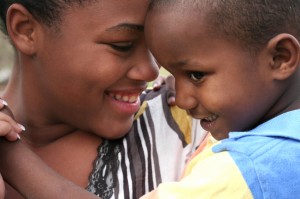Benefits of Mindful Parenting
 You’re running late, picking up some last-minute groceries. Your 7-year-old is dressed for baseball practice, and your 3-year-old has just kicked off her shoes in the middle of the freezer aisle. Frantically, you attempt to put her shoes back on, which sends her into a tantrum. At this exact moment, your 7-year-old catches a glimpse of the time on your phone and impatiently complains, “We’re going to miss my practice! You always make me late!” People start looking at you — judging you, you imagine. Your daughter flings off the shoe you just put on. Your son is starting to tear up and stamp his foot. You sense the tension tightening your face, feeling your fuse about to blow. For many parents, this is just another trying moment when they run the risk of “snapping” or “losing it” with their kids. Yet, it’s moments like these that make mindfulness such a valuable tool in parenting.
You’re running late, picking up some last-minute groceries. Your 7-year-old is dressed for baseball practice, and your 3-year-old has just kicked off her shoes in the middle of the freezer aisle. Frantically, you attempt to put her shoes back on, which sends her into a tantrum. At this exact moment, your 7-year-old catches a glimpse of the time on your phone and impatiently complains, “We’re going to miss my practice! You always make me late!” People start looking at you — judging you, you imagine. Your daughter flings off the shoe you just put on. Your son is starting to tear up and stamp his foot. You sense the tension tightening your face, feeling your fuse about to blow. For many parents, this is just another trying moment when they run the risk of “snapping” or “losing it” with their kids. Yet, it’s moments like these that make mindfulness such a valuable tool in parenting.
As a practice, it’s easy to see how mindfulness can help us in raising our children. Our kids are capable of setting off a wide range of emotions in us. At times of stress, they often trigger unresolved issues from our own childhoods. In those moments, our reactions to them may be inappropriate to the present and are instead, based on the past. By being more mindful, we can pause before reacting, taking time to calm ourselves down. We can remind ourselves to breathe for a minute, become more aware of the present moment and choose to respond in a manner consistent with how we want to treat our child.
When we fly off the handle with our children, we are often oblivious to how their young eyes perceive us. To them, in those moments where we lose control, we can be terrifying. We are the ones who are supposed to make them feel safe. Our size alone can be intimidating, so imagine how seeing us towering over them, red with anger and losing our temper will incite fear in them.
For example, in the grocery store scenario, it’s easy to picture a parent first turning to the son and shouting, “Stop whining! You’re not a baby! Can’t you see your sister is upset?” The parent may then abruptly sweep up the daughter and angrily throw her shoes into the shopping cart. The parent’s fuming expression and mannerisms are likely to alarm both young children. What they will learn in that moment is fear, not to be better behaved. In fact, at those times, what we are actually modeling for them is out of control and aggressive behavior.
Being mindful allows us to step back from the situation, observe our emotional reaction, take a breath and act in a calmer, more rational manner. In this same scenario, the parent could acknowledge the children’s frustration by first looking the son in the eye and saying, “I understand that you’re frustrated. I’m sorry we’re running late. I’m going to help your sister calm down, so we can get going to your practice.” The parent could then deal with the daughter’s tantrum or emotional storm by staying calm, providing a sense of safety and then, as she quiets down, redirecting her attention.
Apart from regulating our own emotions and reactions, mindfulness allows us to be more attuned and sensitive to our children. It isn’t only in stressful situations that mindfulness helps us better relate to our kids. Psychologist Dr. Donna Rockwell talks about how mindfulness facilitates our ability to be present with our children. This doesn’t mean coddling our children by catering to their every whim or giving them our constant attention. What it means is letting them know that we’ll make time for them and following up in our actions.
When we’re spending time with our children, we should aim to be present, putting away our devices and really listening to what they have to say. This reinforces the message that you’re there for them and willing to make time for personal contact and have a shared experience.
In addition to practicing mindfulness ourselves, we can cultivate mindfulness in our children starting at a very young age. Teaching mindfulness practices to our kids helps grow their middle prefrontal cortex, the part of the brain that regulates the body, promotes attuned communication, strengthens the “pause button,” creates emotional balance, calms fears and incites empathy, intuition and morality — all characteristics we’d like our children to be equipped with throughout their lives.
When we think about it, most adult problems (in relationships, careers, etc.) arise when we are not fully present and are not able to regulate our emotions. Not being able to calm down in the moment and make conscious choices about how we want to behave often results in behavior that we later regret. The tools mindfulness practice provides will make our children more resilient when facing the stresses in their lives, including those involving school, bullying, peers, parents and teachers. Kids can learn from a young age that it’s okay to feel whatever they feel, but that they don’t have to act from emotion, that they can instead act rationally. They can formulate a sense of safety and security within themselves by developing their ability to tolerate emotions and building the skills to calm themselves down.
We can help our kids to achieve this balance by teaching them to integrate what mindfulness expert Dr. Daniel Siegel calls their upstairs and downstairs brains. They can use the higher functions of their brain to calm down the emotional limbic areas. We can also help them connect the more emotional right side of their brain with their more logical left hemisphere. ”
As Siegel points out in his book Parenting From the Inside Out, lecturing our children or trying to appeal to their left brain logic won’t work when they’re upset or caught up in these “emotional storms.” Instead, we should aim to appeal to their right brain by connecting to them from our right brain. We can do this by reaching out to them, making physical contact, eye contact and addressing their feelings. By reflecting what they feel back to them, we show that we understand them. “It seems like you feel really sad about this,” or “I can see how that makes you really angry.” This process can help our kids make sense of how they’re feeling, and by naming the feeling, they’re better able to tame it.
After the child calms down, we can bring in the left brain logic to help him or her make sense of or resolve the situation. By providing this type of experience, we help to wire our child’s brain, so they will be better able to regulate their own emotions in the future. Plus, when we practice mindfulness ourselves, our children are less exposed to trauma.
Taking the time to practice mindfulness with your child, even a few minutes in the morning or before bed can have significant benefits for both parents and children. There are simple exercises you can do with a child, such as teaching them to pay attention to their breath, that they can then use as a tool to help them calm down. When they are very young, you can have them lie down and put a favorite stuffed animal on their stomach and have them “rock it to sleep” by moving their stomach up and down by breathing in and out slowly.
For adults and kids alike, Dr. Donna Rockwell suggests breathing in for six counts, then focusing on the out breath by counting down from five to zero. When you breath out, you can picture letting go of stress. Try it when you are stressed, and you will notice feeling a lot calmer in just a few minutes.
Practices like these can be done anywhere at any time, even in the line at the grocery store. They help both children and adults to feel more centered and to observe their emotions without letting them overpower them. We, both parents and children, can gain a sense of control inside ourselves that allows us to know ourselves better and choose how we want to behave. Due to these rewards, of all the lessons we can teach our children, teaching them how to be more mindful is a gift that will keep on giving throughout their lifetime.
Tags: good parenting skills, meditation and children, mindful with children, mindfulness, parent child communication, parenting advice, parenting skills, parenting tips, stress and parenting









Leave a Reply